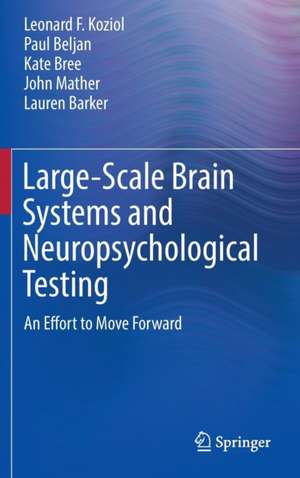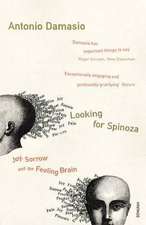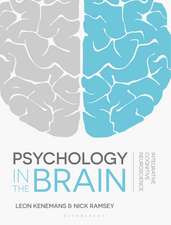Large-Scale Brain Systems and Neuropsychological Testing: An Effort to Move Forward
Autor Leonard F. Koziol, Paul Beljan, Kate Bree, John Mather, Lauren Barkeren Limba Engleză Hardback – 12 sep 2016
This leading-edge volume offers a new framework for neuropsychological testing rooted in the current evidence base on large-scale brain system interactions. Expert coverage brings traditional discrete areas of cognitive functioning (e.g., attention, memory) in line with highly nuanced relationships between cortical and subcortical processing. The new findings point to more accurate and targeted testing, as authors expand on the judicious addition of nonstandardized methods to core diagnostic tools and the underused capacity of neuropsychological testing to assess social behavior and personality. The book’s emphasis on cognition in context gives practitioners better understanding of assessment and evaluation, leading to improved diagnosis, treatment, and outcomes for individuals as well as significant improvements in the field.
This innovative reference:
- Reframes cognitive functioning in light of current data on brain interconnectivity.
- Critiques current methods of neuropsychological test interpretation.
- Reviews known, useful interpretive methodologies within a new context.
- Features instructive case examples emphasizing accurate historical and test data.
- Revisits the strengths and limitations of the bell curve construct.
- Examines the interpretive significance of pathognomonic signs.
- Details strategies for making neuropsychological evaluations more clinically relevant.
Large-Scale Brain Systems and Neuropsychological Testing combines current findings, clinical sense, and common sense to ground neuropsychologists, school psychologists, child psychologists, and clinical social workers in the effective assessment of real-world functioning.
| Toate formatele și edițiile | Preț | Express |
|---|---|---|
| Paperback (1) | 447.03 lei 43-57 zile | |
| Springer International Publishing – 9 iun 2018 | 447.03 lei 43-57 zile | |
| Hardback (1) | 527.15 lei 43-57 zile | |
| Springer International Publishing – 12 sep 2016 | 527.15 lei 43-57 zile |
Preț: 527.15 lei
Preț vechi: 620.18 lei
-15% Nou
Puncte Express: 791
Preț estimativ în valută:
100.88€ • 104.68$ • 84.32£
100.88€ • 104.68$ • 84.32£
Carte tipărită la comandă
Livrare economică 17-31 martie
Preluare comenzi: 021 569.72.76
Specificații
ISBN-13: 9783319282206
ISBN-10: 3319282204
Pagini: 210
Ilustrații: XIX, 141 p. 15 illus., 1 illus. in color.
Dimensiuni: 155 x 235 x 11 mm
Greutate: 0.41 kg
Ediția:1st ed. 2016
Editura: Springer International Publishing
Colecția Springer
Locul publicării:Cham, Switzerland
ISBN-10: 3319282204
Pagini: 210
Ilustrații: XIX, 141 p. 15 illus., 1 illus. in color.
Dimensiuni: 155 x 235 x 11 mm
Greutate: 0.41 kg
Ediția:1st ed. 2016
Editura: Springer International Publishing
Colecția Springer
Locul publicării:Cham, Switzerland
Public țintă
ResearchCuprins
Review and summary of systems. - Review of basic concepts of neuropsychological test interpretation. - Guidelines for interpreting neuropsychological test results in children. - Guidelines for interpreting neuropsychological test results in adults. - Applications of neuropsychological principles to explain social behavior and evaluate personality.
Notă biografică
Leonard F. Koziol is a clinical neuropsychologist with specialty board certifications in neuropsychology and pediatric neuropsychology and a recognized expert in executive function disorders. His neuropsychology practice is located in Arlington Heights, Illinois where he works with children, adolescents, and adults with attention or concentration problems, memory difficulties, executive dysfunction, and learning disabilities both in clinical and school settings. Dr. Paul Beljan is the past president of the American Board of Pediatric Neuropsychology. He holds child and adult diplomat qualifications with the American Board of Pediatric Neuropsychology and the American Board of Professional Neuropsychology. Dr. Beljan completed two post-doctoral fellowship programs in pediatric psychology and pediatric neuropsychology, and has completed coursework for his post-doctoral master’s degree in psychopharmacology. John Mather, Ph.D., has worked as a neuropsychologist, school psychologist,educational administrator, and educational consultant for fifteen years. Dr. Mather has extensive experience with both pediatric and adult clinical populations. Dr. Mather is a respected expert in areas of dyslexia, dysgraphia, dyscalculia, executive function deficits, autism spectrum disorders, gifted intellect, traumatic brain injury, attachment disorders, and Tourette’s disorder. Kathleen Bree, PsyD completed a pre-doctoral internship and a post-doctoral fellowship in pediatric neuropsychology with Dr. Beljan. Dr. Bree’s professional focus includes evaluation of autism spectrum disorder, attention and executive functioning deficits, learning disorders, and gifted intelligence, with particular emphasis on the impact a child’s neuropsychological functioning has on the child’s behavior.
Textul de pe ultima copertă
This leading-edge volume offers a new framework for neuropsychological testing rooted in the current evidence base on large-scale brain system interactions. Expert coverage brings traditional discrete areas of cognitive functioning (e.g., attention, memory) in line with highly nuanced relationships between cortical and subcortical processing. The new findings point to more accurate and targeted testing, as authors expand on the judicious addition of nonstandardized methods to core diagnostic tools and the underused capacity of neuropsychological testing to assess social behavior and personality. The book’s emphasis on cognition in context gives practitioners better understanding of assessment and evaluation, leading to improved diagnosis, treatment, and outcomes for individuals as well as significant improvements in the field.
This innovative reference:
- Reframes cognitive functioning in light of current data on brain interconnectivity.
- Critiques current methods of neuropsychological test interpretation.
- Reviews known, useful interpretive methodologies within a new context.
- Features instructive case examples emphasizing accurate historical and test data.
- Revisits the strengths and limitations of the bell curve construct.
- Examines the interpretive significance of pathognomonic signs.
- Details strategies for making neuropsychological evaluations more clinically relevant.
Large-Scale Brain Systems and Neuropsychological Testing combines current findings, clinical sense, and common sense to ground neuropsychologists, school psychologists, child psychologists, and clinical social workers in the effective assessment of real-world functioning.
Caracteristici
Reframes cognitive functioning in the current understanding of brain interconnectivity Describes use of standardized testing to increase understanding of cortical and subcortical processing, including their interactions Features numerous case studies exemplifying accurate interpretation of neuropsychological tests?













